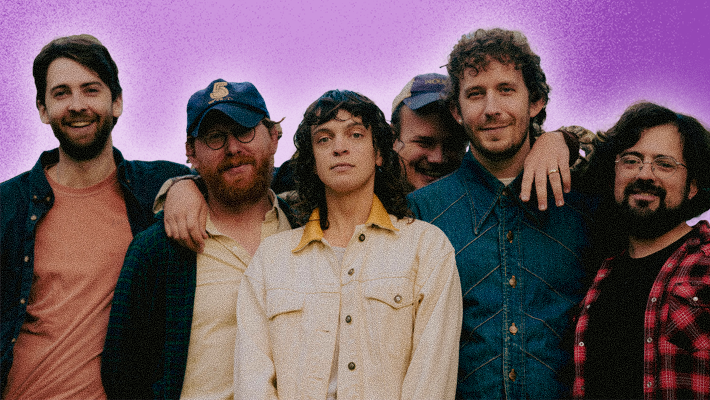-
 play_arrow
play_arrow
DisnDat HITZ DisnDat HITZ
-
 play_arrow
play_arrow
Warlando Hitz Warlando Hitz
-
 play_arrow
play_arrow
DisnDat Tunez Reggae,Dancehall and Afro Beats
Aaron Dowdy started writing songs because of Gillian Welch and David Rawlings. It started at age 11, when his parents took him to a music festival in their hometown of Bristol, Virginia. The musical duo had recently released their seminal album Time (The Revelator), which young Aaron loved. But it was the song at the end of the set — performed with another famous Americana act, Old Crow Medicine Show — that left the most lasting impression.
“They did a cover of ‘The Weight,’ with everyone taking a verse,” Dowdy, 32, recalled. “It was so ecstatic, and I was like, ‘I have to write a song.’ It just hit me like a ton of bricks.”
Writing songs wasn’t exactly typical in Bristol, for 11-year-olds or anyone else. Even though Bristol is sometimes credited as the home of country music (or a home, anyway) due to The Carter Family’s roots there. But nobody in Dowdy’s peer group was playing music at the time. And as a Jew living in a community where the local synagogue drew just 60 members from a 100-mile radius, he was used to feeling like an outsider. As he saw it, “It was punk to write songs.”
Dowdy’s father — a devotee of Van Morrison and Neil Young who worked at the local chemical plant — encouraged Aaron’s artistic impulses. And he went the extra mile, procuring and setting up home-recording equipment for his son.
“Home recording was part of songwriting from the very beginning for me,” Dowdy said when I reached him in early April. “It wasn’t about playing shows, it wasn’t about having a band, it was about recording. That’s been my whole project for the past 20 years. It wasn’t until the last two records with Fust that I felt like the songs have become coherent enough — and I’ve committed to having a band for the first time in my life — where I’ve committed to playing shows.”
Dowdy is referring to the band he is currently touring with in support of Big Ugly, the excellent album Fust released in March. I caught the six-piece ensemble last week at Minneapolis’ historic rock club 7th Street Entry — a gig Dowdy says he was extra-excited about, and I don’t think that was just stage banter — and they put on a musically rambunctious and spiritually big-hearted show that felt directly descended from that fateful performance of “The Weight” more than two decades ago.
On record, the focal point is squarely on Dowdy’s songs, which marry hearty alt-country music with impressionistic lyrics infused with authentic small-town southern lore. He is especially fond of deploying regional slang that might be confounding to outsiders, starting with the album title (named after one of the record’s best songs), which refers to an unruly, unsightly creek. On stage, however, Fust has a communal band vibe that’s immediately inviting, starting with the interplay between Dowdy and singer/fiddle player Libby Rodenbough, and extending to the lively interjections of pianist (and long-time Dowdy collaborator) Frank Meadows.
Seeing Fust live only made me love Big Ugly more, and it was already one of my favorite albums of early 2025. It sounds like a potential breakthrough for a band that has been active in some form since 2017, when Dowdy — who currently lives in Durham, North Carolina, where he’s a Ph.D. candidate in literature at Duke University — launched the project as a songwriting vehicle that over time has evolved into a proper band.
There were no expectations of success or even minimal exposure at the start, though that began to change somewhat in the early 2020 when Dowdy hooked up with the rising indie label Dear Life Records, which started putting out MJ Lenderman’s music around the same time. On 2023’s Genevieve, Fust became something more than a home-recording lark, and with Big Ugly, Dowdy’s songwriting and collaboration with the other musicians has achieved full maturity.
With the success of Lenderman and fellow NC act Wednesday, Dowdy freely admits that Fust now has a shot at a wider audience. I talked to him about that, as well as songwriting, the southern novelists that have influenced him, and the meaning of “fust.” But first, please enjoy what will likely be one of the year’s very best rock songs, “Spangled.”
For almost 10 years now, I’ve seen this cohort of artists and songwriters who are part of what I would call The Bandcamp Generation. I’ve talked to many artists who started out recording songs, and then after they got popular online they formed a band and started playing shows. Basically, the inverse of how it used to work. That’s been Fust’s path.
It was like, “This seems pointless, it’s so big, music’s so wild, no one’s paying attention. Your best friends are writing the best songs you’ve ever heard and we’ll release stuff for you to listen to.” That’s what music was for me for the longest time, and it still is. My best friends are all my favorite songwriters and none of them release their music, it’s just they share it with me on private links. That’s the community I came from — no expectations, or the lowest expectations possible.
My biggest collaborator, Frank, started working with Michael Cormier at Dear Life Records, when they were just starting out as a tape label. Frank sent him some of my weird demos, and Mike really loved them. He was like, “Maybe we’ll put them out on this label I’m starting.” That’s what made the slightest change in things. Nobody in my world had ever been like, “Let’s start a label,” it was just about putting it out on Bandcamp. So, having that little sign-off from Mike at Dear Life was the changing point in a long relationship with recorded music for me.
You mentioned Time (The Revelator) as a childhood touchstone, and there’s a straight line you could draw from that record to your music. Have you always worked in this folk/country/rock vein? Or did you ever have an adolescent “ska period,” or whatever?
I always liked — not to be too crude — really fucked-up music. Like The Modern Dance by Pere Ubu. But I didn’t know how to write music like that. I always wanted things to be more complicated and not in the folk form of “here’s the verse and here’s the chorus.” I shied away from that for a long time. I had a period where we were downloading royalty-free music and trying to write the craziest songs over those. It was always just an experiment of recording, but I think the through line was always a love for song. That’s my form.
Singing along to Van Morrison songs was my real education. Same thing with Neil. Fust is the first time where I felt comfortable letting go of a lot of preconceptions that music has to be this wild thing and really falling back in love with the form of a song, a traditional form that I grew up with and that I’ve always searched for.
As a Ph.D. candidate in literature, you are obviously well-read. What authors influenced you as a lyricist?
Obviously, Faulkner was an early example of somebody that I read in high school. Larry Brown is another southern writer who writes character in a way that I really identify with, where the character doesn’t have to be somebody that is real and it doesn’t even have to be a character that has a lot of inner life. It’s a character who can be a meaning unto itself. Southern literature is always really great at character, and I am looking at character a lot in these songs.
I’m always looking when I’m reading. I’m trying to find what the song is. Robert Stone is somebody I’ve read a lot, and I’m looking at his writing like, “Is there a song that could emulate how he develops character?” The last couple records — I don’t know if you want to call it literary — but it’s using tropes that are shared with literature. I am trying to have the lyrics do something in a way that a novel creates meaning with themes. I don’t want it to be too highbrow, but that’s just naturally where I tend to go.
What most intrigues me about your lyrics is how they derive from this self-contained world. You use a lot of slang and jargon that feels colloquial and southern — phrases repurposed for song titles like “Gateleg” and “Doghole” and “Goat House Blues” and “Big Ugly.” I’m also thinking of the part in “Jody” where you use “heavy” as (I think) a euphemism for “beverage.”
Yeah, it could be. A hard liquor or a Bud. But it’s definitely more than that. There’s an old ballad called “The Frozen Logger” where the logger stirs his coffee with his thumb. It’s an image of a rough and careless physical gesture that, I think, opens up a lot. Calling it “heavy” is one of those words that should unlock more than just the idiom or the colloquial use.
It just makes me think about going to a small-town bar where everybody knows each other. And you walk in as an outsider and the room quiets for a minute. And then they go back to their in-jokes and private stories. Nobody is going to explain anything to you. You just listen and figure it out. Your songs feel like that when you use those local slang terms.
I guess they’re local. It’s one of those things that you forget are local until someone shows that they’re local by saying “I have no idea what you’re talking about.” But yeah, a lot of those words — goat house and doghole and gateleg — make you feel like you’re confused from the start. They become expressive unto themselves just because of their nature of being odd or barred from immediate understanding.
You made Big Ugly with Alex Farrar, who has also worked with Wednesday and MJ Lenderman. You are all based in North Carolina, and from the outside it feels like a coherent scene that’s pretty exciting. As someone on the inside, however, do you see it as a scene? Or are you just a bunch of musicians who happen to live in the same general area?
It’s definitely more of a scene than it’s not, but there’s so many elements to it. Like, Jake and Carly are huge. I don’t want to say it’s a fluke because both are incredible. It’s just that they’re huge, so we’re dealing with a different scale there a little bit in terms of visibility and engagement. But there’s no doubt about it that they have made us more legible. Their visibility opened up a kind of legibility for us, for people to be one, what’s going on in that region, and also a kind of comfort with that kind of song and that kind of imagery. I think we are lucky that people really love their music because it seems to oil and soften people’s expectations to maybe also like our music. But I think of them first and foremost as friends, which maybe is what a scene needs, where there’s all these bands and no competition. It doesn’t feel like there’s tension. It feels like we’re friends, and I love to see them and talk with them and hang with them. And it just so happens that we all make music and people are hearing it, and we’re all from North Carolina.
Before I let you go, I have to ask about the band name. When I tell people to listen to Fust, I often get this quizzical look about what, exactly, “fust” is. So: What, exactly, is fust?
I started writing Fust songs in 2017, and I was listening to a lot of private press country records that sounded awful. We were trying to find the strangest, nastiest sounding songs. And then I was like, “I’m going to do a project where I write songs, but it’s going to sound bad. And it’s going to be part of a very minor tradition of home-recorded music.” I needed a name for it, and I wanted something kind of gnarly and ugly. A word that could appear to be offensive, but was not.
I was thinking a lot about my great-grandfather’s house in West Virginia. There’s a smell there, such a weird smell. As a kid, you’d go in, and it would be so disarming at first, this old musty, mildewy smell, and it became the most romantic thing for me. How can this nasty smelling thing become romantic? That’s fust. It’s got a fust. It just means a kind of gnarly old and unused lingering smell that, I think, is romantic. I love that tension between something that’s just not right, a little crude and is yet the romantic ideal.
Big Ugly is out now via Dear Life Records. Find more information here.
Written by: dev
Similar posts
-
Recent Posts
Recent Comments
Featured post
Latest posts
Current show
Upcoming shows

Frequency One
Mixed by Dj Monster
3:00 pm - 11:40 pm
Pop’n Roll
Mixed by Rebecca Lost
11:40 pm - 11:55 pm
Orlando Sessions
Presented by DISNDAT
11:55 pm - 12:00 am
ChillBeats
Presented by Monica Deep
12:00 am - 5:00 am
Good Morning London
With Cindy and Brandon
5:00 am - 6:00 amChart
Chart
-
Top popular

Female Corrections Officer Who Got Smashed In Front Of 11 Inmates… Wants You To Bail Her Out! (6 Sec IG Message)

Music, Economics, and Beyond

Tragedy Unfolds At Rock Hill Smoke Shop! Aftermath Shows Witness Fighting To Save One Survivor After 2 Fatally Shot & 1 Critically Injured Inside

Geez, Wait Till You See It From The Back: Recoil Like A Mac10 With No Attachments!

Stainless Steel Juicer – Making Juicing Fun And Easy
Quick links
Our radio.
COPYRIGHT All rights reserved.
Site Design by Superior Business Solutions.

















